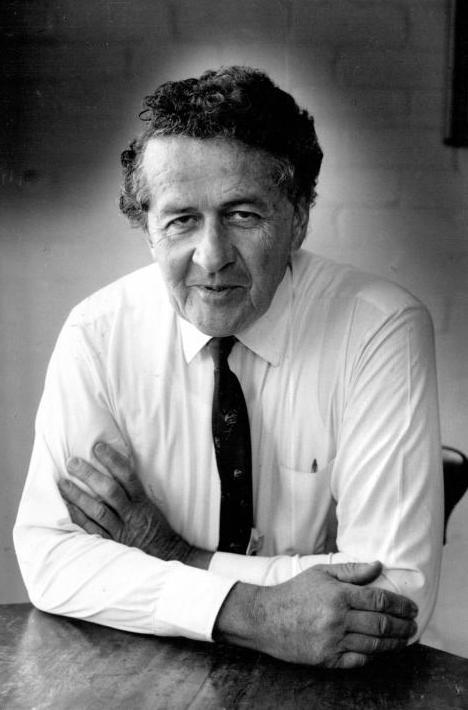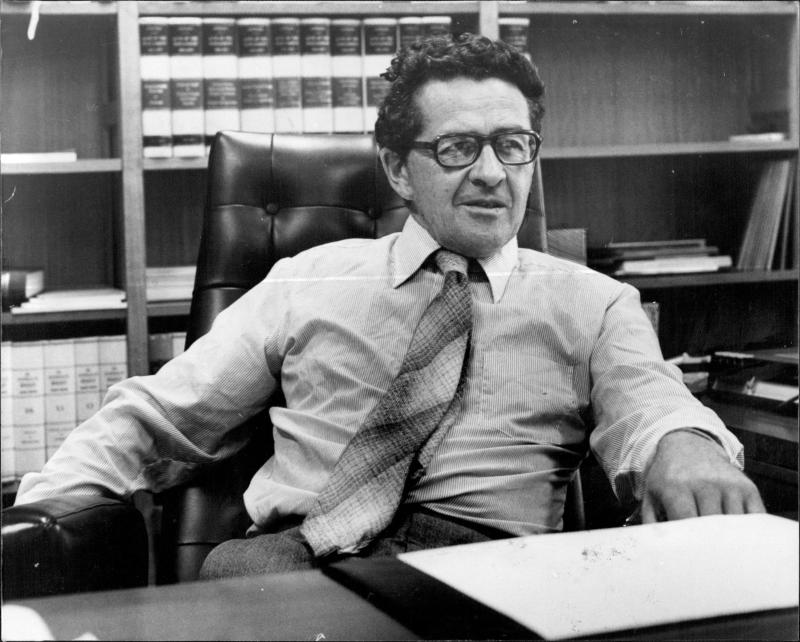The Hon. John Haldan 'Hal' Wootten AC QC
(1922- 2021)
Barrister, Queen’s Counsel, Foundation Dean of Law UNSW, Judge of the Supreme Court NSW, Royal Commissioner and Activist
 J
ohn Haldan
Wootten AC QC (Wootten QC) was a legend in his own lifetime. He was a champion of the Rule of Law and defender
of
the underdog. He improved society at every opportunity. He had a prodigious intellect with a powerful social
conscience – a brilliant combination which allowed him to shine the light on many social causes. He was tireless
in
his efforts to speak for those with no voice. He was a practitioner, jurist, judge and Royal Commissioner and an
ever-vigilant citizen, a strident fighter for equality, law and freedom. Wootten QC had an unmistakable ability
for
action over words. The Bar remembers Hal Wootten QC as a beacon of humanity.
J
ohn Haldan
Wootten AC QC (Wootten QC) was a legend in his own lifetime. He was a champion of the Rule of Law and defender
of
the underdog. He improved society at every opportunity. He had a prodigious intellect with a powerful social
conscience – a brilliant combination which allowed him to shine the light on many social causes. He was tireless
in
his efforts to speak for those with no voice. He was a practitioner, jurist, judge and Royal Commissioner and an
ever-vigilant citizen, a strident fighter for equality, law and freedom. Wootten QC had an unmistakable ability
for
action over words. The Bar remembers Hal Wootten QC as a beacon of humanity.
'Hal' Wootten was born on 19 December 1922 just after the Great Depression, into a rural family in the Northern Rivers District of NSW (near Tweed Heads). His father died in Wootten QC’s infancy. He lived with his mother and her parents on the land for the early years. In time, mother and son moved to Willoughby on the lower North Shore where he commenced primary school.
Wootten QC attended Sydney Boys' High and then the University of Sydney, at the time the only Law School in NSW.
Wooten QC was an articled clerk for a time at the Crown Solicitor’s office while studying, and he developed a great social conscience there. It is well-known that for a time, he dabbled with and joined the Communist Party in the heady days when a seam of political talk was punctuated by McCarthyism, 'Red China', 'Reds under the Bed', 'Pinkos' and the Petrov Affair – those whispers resounded throughout the Anglosphere in the 1950s—1970s.
First and foremost, Wootten QC was a teacher of the law. He started at the now defunct Australian School of Pacific Administration (ASOPA) which became the Australian Development Assistance Bureau, an old-fashioned organisation which looked after affairs of the Indo-Pacific – our neighbours – and our relations with them. He engaged the interest of Sir John Kerr QC (later Governor-General) who was the head of ASOPA, together with Ian Hogbin the eminent anthropologist. Wootten QC, ever the intrepid traveller, sojourned in Manus Island for field work, an experience which he described, years after, as a most fascinating time and an ethnographer’s delight.

Wootten QC was a solicitor at Minter Simpson & Co, having completed his articles, and he was promptly called to the Bar in 1949. In 1966, he took silk, and was by then, eminent in the sphere of industrial law.
Wootten QC practised at the Sydney Bar from the Tenth Floor among such luminaries as Gough Whitlam QC, Sir John Kerr QC, Trevor Morling QC, MLD Einfeld QC, Kenneth Gee QC and Keith Mason QC. During this time, he continued contact with the Pacific countries and Australia’s near neighbours such as Papua New Guinea (New Guinea Committee of the Law Council of Australia).
In 1972, Wootten QC became the foundation President of the Aboriginal Legal Service – which arose from two Aboriginal men who were victims of police harassment in Redfern. This was one of his finest moments, as he had championed the beginnings of the specialist network of pro bono practitioners who would act for the two Indigenous men. Wootten QC recognised the unique nature of Indigenous Australian rights and relations and their very real, almost inevitable, barriers to legal representation. Wootten QC first raised Aboriginal rights and access to justice in the 1970s. Legal representation became a public priority and the need for a stand-alone organisation dedicated to providing free legal services including specialist advocacy services with the support and collaboration of Bob Debus, Garth Nettheim and Richard Chisholm. This was the era when Mum Shirl’s singular work and care in inner Sydney came to prominence, when services for and awareness of first Australians was still nascent. Gradually, society started to catch up with Wootten QC’s thinking and realised that lesser privileged lives required attention and care. His work reverberates down the years, and it commenced the long journey of recognising Aboriginal rights in this country. Wootten QC always had a great instinct for what mattered to people on a practical level and he championed the Aboriginal cause throughout his life.
On 8 September 1969, Wootten QC became the foundation Dean of the Faculty of Law at the University of New South Wales. Wootten QC had a magnificent intellect and this role was a perfect foil. He relished the opportunity to seize the role and establish a Law School of a different ilk. Practical realities always appealed to him more than theoretical and pure academic platitudes. He left no stone unturned and he would be its guiding light. Famously, he said during his tenure as Dean, 'Law students matter because lawyers matter and the Law matters.' Wootten QC’s stewardship of that law school both in an academic capacity and in a professional capacity, was effectively timeless and without peer. Years later he would attend all of the orations held in his honour annually with such speakers as Noel Pearson, Bret Walker SC, Sir Gerard Brennan and Julian Burnside QC. He resigned as Dean in early 1973 and returned to the Sydney Bar.
On 17 September 1973, Hal Wootten QC was sworn in as judge of the Supreme Court of NSW. As Mr Justice Wootten he sat as a puisne for a decade in the Equity Division of the Supreme Court. At that time, Wootten QC’s brethren on the Court were names that loomed large: Sir Laurence Street, Needham QC, Hutley QC, Waddell QC and Kearney QC, HH Glass QC, Mahoney QC and Asprey QC and of course, a young Michael Kirby. It was a Court of legendary identities, each of whom, including Wootten QC himself, earned a place in the pantheon of judicial history.
In 1984 and 1986, Wootten QC was the chairman of the Australian Press Council, an influential body which weighed in on the media ownership debate at the time. Giving vent to his views was a favourite occupation, and he remonstrated against Murdoch’s proposed control of 70 per cent of Australian print media deeming it to surpass any totalitarian regime known to him at the time, as he astutely observed in the Sydney Morning Herald.
In the early 1970s, Wootten QC separated from his first wife Dorothy with whom he had four children. In 1976 he married the late the Hon. Jane Mathews, District Court judge, Supreme Court judge, president of the AAT and judge of the Federal Court of Australia. His third wife was Professor Gillian Cowlishaw, professor of anthropology.
Post retirement from the Supreme Court of NSW, Wootten QC became the Royal Commissioner into Aboriginal Deaths in Custody in 1987; he was one of five such Royal Commissioners. He was especially energetic in the report writing as he had many Aboriginal friends in NSW, Victoria and Tasmania. It was a topic which had greatly moved him to act. Some 25 years later, the reports, recommendations and findings of his landmark Royal Commission were revisited.
In 1990 Wootten QC was made a Companion of the Order of Australia recognising his services to human rights, to conservation, to legal education and to the law.
A political struggle about which he had read continuously and about which he had an abiding personal fascination, was the conflict in the Middle East. In 2007 Wootten QC, aged 85, moved to Ram’allah on the West Bank for three months. It was the first of some special trips to the region and to Gaza and on at least one occasion he was, briefly, arrested. What he observed there ignited a passionate response. He searched and collected literature on the life and conditions of Palestinians over the years. He followed his usual methodology of immersion in the subject, i.e., to read, research and become erudite on a matter before investing the personal dimension. He conducted interviews and spoke with people on both sides of the conflict and wrote about the Palestinian treatment by the Israeli government. He was passionate and compassionate. He befriended the Deans of five Palestinian law schools located in the area and deliberately, so as to invite them to Sydney on a personal exchange shortly afterwards. Subsequently, such was his interest in the people and the places he visited, that he was instrumental in establishing the Palestinian Film Festival in Sydney.
Wootten QC, aged 92, studied for a Diploma of Middle Eastern Studies and learned the Arabic language. This time coincided with his daughter, Vicki, falling ill and predeceasing him.
In latter years, Wootten QC aged in his 80s and 90s was spry and his intelligence sparkling. He cared about his causes, and was even the Deputy President of the National Native Title Tribunal (1994-1997). He negotiated agreements between mining companies and Aboriginal communities in NSW and in Cape York and elsewhere. He never lost his judicial temperament and bearing which were only amplified by his acute and practical sense of fairness.
Wootten QC was a hardy soul, and he maintained a signature energetic good health until he turned 93 years old. On an outing in his beloved Royal National Park, he had a fall and broke his femur. This was a real setback. It put an end to playing tennis twice per week and bushwalking and kayaking. He was defiant and could not believe that such a thing had happened to him. This was hard for him to accept despite his great age. Healing took time and effort. But he was as determined as ever. It was best to endure that which he could not change and he did so with grace. He loved the outdoors and being in the natural environment. He studied for a Diploma in ornithology in his late 70s, for intellectual stimulation and interest. He was an avid bird watcher and a breeder of sprinter quarter-horses. Plutarch, the Roman biographer, observed that such events and things reveal a great man’s mind and character, at least as much as his public acts.
Wootten QC was a former president of the Australian Conservation Foundation (1985-1980) and fought to save (yet again) the Franklin River plus ca change… It is no surprise that Wootten QC was frighteningly clever to the end but in a considered way he was a devotee of nature – a Naturalist. Wootten QC was engaged mentally and personally on projects close to his heart – that’s what ignited a certain passion and joy for law, equality and rights and above all – freedom. Wootten QC’s lasting legacy is that he left this world a better place than that which he found. That mark is indelible and is the most precious tribute to him.
The Bar bids Hal Wootten AC QC adieu.
His former wife Professor Gillian Cowlishaw survives him, as do his three children Lindsay, Richard and Phillipa.
Kevin Tang, 8 Wentworth Chambers